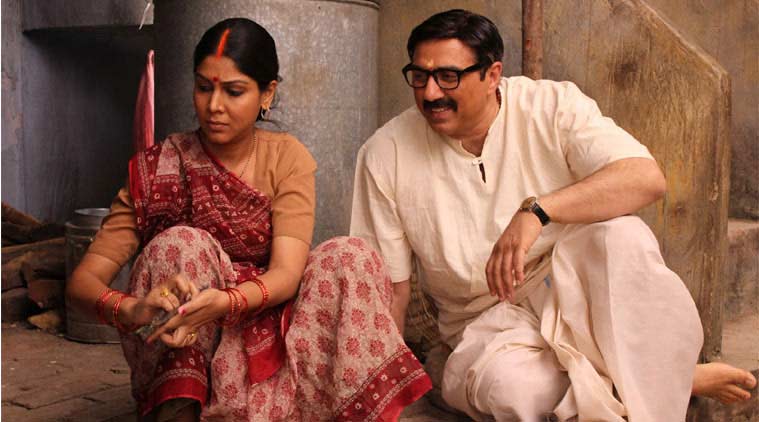 Mohalla Assi movie review: Sunny Deol is earnest, but not really convincing as an Assi dweller.
Mohalla Assi movie review: Sunny Deol is earnest, but not really convincing as an Assi dweller.
Mohalla Assi movie cast: Sunny Deol, Sakshi Tanwar, Ravi Kishan, Saurabh Shukla, Mukesh Tiwari, Rajendra Gupta
Mohalla Assi movie director: Chandraprakash Dwivedi
Mohalla Assi movie rating: One and a half stars
Kashinath Singh’s novel Kashi Ka Assi is a wonderfully sharp observation of the people of Assi Mohalla in Banaras. It’s also a commentary on the social and political turmoil that India was undergoing during the 80s and 90s, when the Ram Janmabhoomi and Mandal movements were growing and spreading and heading towards their inexorable peaks.
Singh positions Kashi aka Banaras aka Varanasi as the holiest of holy Hindu cities, as well as a place of great ancient learning which encouraged the spirit of questioning. How can you learn if you do not doubt?
Mohalla Assi, Chandraprakash Dwivedi’s film which is based on the novel, should have been, by rights, a deeply provocative, challenging film, featuring a Pandeyji (Deol) who is forced to move from his ‘the past is the best’ policy to embracing the present.
Pandeyji makes a meager living as a Sanskrit teacher, and is surrounded by a colourful bunch who use robust earthy cusswords in their everyday conversation. His faithful, ever-fretting wife (Tanwar, who leaves a mark), tired of making do with nothing, has a way with ‘gaalis’ too: in Banaras, as in many places in UP, some of these ‘gaalis’ are not considered ‘bad language’, just words which fill in the gaps.
There’s a smooth-talking tourist guide (Kishan) who lures attractive foreign women into the mouldering homes bordering the ‘ghats’ for an ‘authentic’ Kashi experience: the temporary rent is a welcome addition to family incomes despite their ‘dharm’ being ‘bhrasht’. There’s a hanger-on who tricks his way into becoming a rich baba with ‘gori’ acolytes.
There’s also a group of regulars who are to be found in Pappu Ki Dukan, a shabby ‘chai’ shop which serves as a meeting-point of all kinds: the saffron-clad ‘mandir wahin banayenge’ types (Tiwari), the skull-cap wearing Musalmaan shop owner who has fallen upon bad times, a perpetually cynical beaky-nosed fellow grumbling about the death of the ‘left parties’, and a couple of wise guys who speak words of wisdom: ‘Kashi mein toh yugon se Har Har Mahadev bola jaata tha, yeh Jai Shri Ram kahaan se aaya’?
To be able to hear these words articulated so clearly in a film these days is great. And that too in a film set in Banaras. A character dressed as Bhagwan Shiv (blue-faced, plastic snake around the neck), says: ‘maine toh insaan banaya, Hindu, Muslim, Issai tum logon nein’. This kind of line would have been de rigueur in a masala film in the 60s and 70s; we would have heard it as yet another flowery, cheesy dialogue to exemplify the pluralistic nature of Hinduism, and forgotten it.
That Mohalla Assi has it, feels like an act of bravery. That the film talks of other religions, and other ways of being, while clomping around heavy-handedly about progress and the price of it, is also something.
Sadly, Mohalla Assi is not much of a film. It’s just a collection of choppy scenes, making it seem that it was censored heavily. It’s been in the making for five or six years, and you can see later add-ons: Deol is earnest, but not really convincing as an Assi dweller. The other actors are underutilised (Shukla), or made to declaim loudly, not speak to each other.
So sad, because Mohalla Assi had such potential. It could have been a cautionary film of its time, and for its time.


